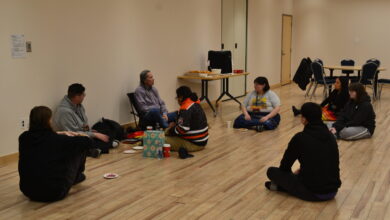GSA budget fails, ongoing concerns with budget items
If there is no additional special meeting, the budget will be voted on at the April 28 GSA council meeting, GSA president says.
 Helen Zhang
Helen ZhangAt the April 9 special meeting of the University of Alberta’s Graduate Students’ Association (GSA) Council, the proposed 2025–26 GSA operating and capital budget failed to pass. The budget has been sent back to the GSA Budget and Finance Committee (BFC).
The special meeting followed the March 24 GSA council meeting at which the motion to approve the budget was postponed as quorum was not met. This meeting included discussion of the proposed 16.75 per cent reduction to the associate vice-president (AVP) of labour‘s annual stipend, benefits, and employer contributions.
At the March 24 meeting, GSA President Haseeb Arshad reported that the GSA will maintain a balanced budget. He said that a primary driver of expense increases was the application of a 2.2 per cent consumer price index (CPI) adjustment. He noted that GSA membership fees have increased by 1.5 per cent, below CPI.
The budget line for “business travel and external relations and advocacy” has increased to $30,000 from the 2024–25 budgeted amount of $24,368.
The budget also includes the introduction of the new vice-president Indigenous relations (VPIR) position. The Directly Elected Officers (DEO) stipend budget increased to $233,829 from the 2024–25 budget of $192,189, due to the creation of this position.
Additionally, there is a new $27,000 budget line for the GSA conference. This line was created by reallocating funds the GSA previously gave to the Campus Food Bank (CFB). The CFB now receives dedicated student fees from graduate students, Arshad said.
Ongoing concerns with AVP labour salary reduction
Arshad also noted the reduction to the AVP labour stipend, benefits, and employer contributions. Concerns about this reduction have been brought to GSA council previously. According to Arshad, there were extensive consultations surrounding this budgetary decision between May 2024 and March 2025.
“I can assure you that this probably is the only recommendation in the budget that has been discussed with this length,” Arshad said.
According to Arshad, the reduction was informed by AVP labour salaries across different Alberta GSAs. He said that his initial recommendation was to reduce the AVP labour stipend by $15,000. Arshad added that he expects that through loss of pay, the AVP labour “will make exactly the same as other VPs.”
According to the incoming AVP labour Nathan Lamarche, Arshad “completely lied” about how loss of pay would work in this position. Lamarche said that loss of pay would not result in additional payment for the AVP labour, it would only match their stipend.
“The literal concept of loss of pay — and it’s literally in the name — is that your pay doesn’t change. You get money because you lost pay. It is not excess.”
According to Lamarche, this cut is “weakening the ability of the [AVP labour] to do their job.”
Deposed UCGSA AVP labour says UCGSA is “setting a precedent” for other GSAs
According to Karina Hincapie Martinez, the Graduate Labour Union (GLU) at the University of Calgary was dissolved by the U of C Graduate Students’ Association (UCGSA) board on February 24. Hincapie Martinez, AVP labour for the UCGSA, had her position dissolved as a result.
“This reduction, or whatever it is, is just a way to start drowning the [AVP labour] position,” she said.
The UCGSA is “setting a precedent” for other Alberta graduate student associations, Hincapie Martinez said.
During the March 24 GSA council meeting, Arshad said that “[Lamarche] mentioned that the AVP labor of the [UCGSA] never voluntarily reduced their stipend.”
“They did. [Hincapie Martinez] reduced it from $12,000 to $10,000,” Arshad said.
In an interview with The Gateway, Hincapie Martinez said that this comment is “untrue” and she “did not [take] any pay cut.”
Indigenous Strategic Initiatives budget line removed, Lamarche notes
While outlining the budget at the April 9 special GSA meeting, Arshad said that if a VPIR is not elected, the stipend “will be reflected as a surplus.” Lamarche referred to a GSA bylaw that stipulates that if the VPIR position is not filled, the salary is to go to Metis, First Nations, and Inuit (FNMI) students. Lamarche also noted that the Indigenous Strategic Initiatives fund does not have a budget line.
Seidy Louangxay, GSA accountant, said that this line was removed “because last year [the GSA] held a referendum to be able to provide funding directly through the collection of fees that [they] get from students, so that that goes directly to the Indigenous students.”
Arshad said that the funding will go towards FNMI students, but “it will be reflected as a surplus.”
Referring to the Indigenous Strategic Initiatives fund line, Arshad said that “this line is not being removed, it’s just being converged into a DEO strategic initiative.”
Budget fails with 19 votes against and 15 votes in favour
Lamarche expressed concern with the priorities of the GSA’s BFC and their “unilateral control” over the budget.
“[The BFC] have listed what they care about and it is not the graduate students,” Lamarche said.
Arseniy Belosokhov, GSA nominating committee chair, asked if it would be possible to make an amendment to the motion to “approve the budget with changes” instead of sending it back to the BFC. Arshad said that because GSA council has an “oversight position,” this would not be possible as the budget would have to go back to its respective standing committee, the BFC.
“I’m not a big fan of the structure, but that’s what we have to live with,” Arshad said.
“We have to trust the governance system that you have. If the budget goes back to the BFC, BFC has a fiduciary duty to the association, not just to their own selves,” Arshad said.
Prior to the vote being called, Arshad told the council that “if the budget does not get approved in time … I want you remind you all of you [that] everyone of us will be responsible.”
Lamarche called this comment a “threat to the GSA.”
The motion to approve the budget failed with 19 votes against and 15 votes in favour. Following the failed motion, Arshad said that commenting on the fiduciary duty of GSA councillors is “not a threat.” He said that he is “extremely worried” and does not know “what the future of the association will be.”
Arshad mentioned instances of universities — such as the University of Regina and Athabasca University — facing structural issues within their student unions. He said that “the University of Regina [has] cancelled their fee collection agreement with their student union.”
Lamarche also called this comment a “threat.”
The motion for the GSA council to receive for information the operating and capital three-year budget/business plan, the labour union dues three-year budget/business plan, and the restricted and other funding three-year budget/business plan passed with 31 votes in favour and three against.
Arshad said that the budget will be voted on at the April 28 GSA council meeting if there is no additional special budget meeting.
CORRECTION: A correction was issued on December 1, 2025 at 2:15 p.m. to correct a misattributed quote. The Gateway misattributed a quote regarding a referendum that was held to Cindy Roose. Seidy Louangxay was in fact the person who said that quote. The Gateway regrets this error.




